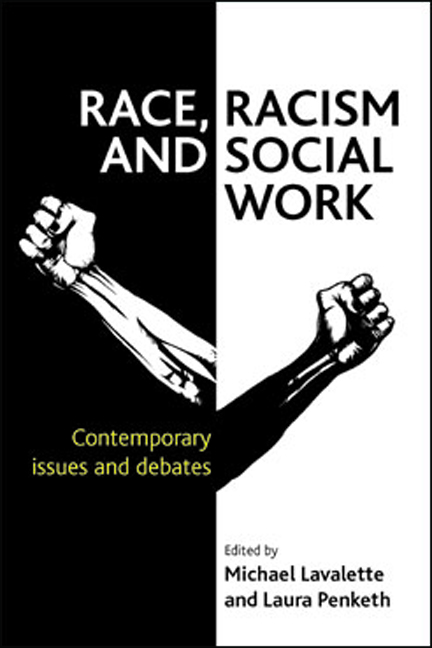Book contents
- Frontmatter
- Contents
- Notes on contributors
- Acknowledgements
- Dedication
- Some terms and definitions
- Introduction: Race, racism and social work
- one Rethinking anti-racist social work in a neoliberal age
- two The growth of xeno-racism and Islamophobia in Britain
- three The catalysers: ‘black’ professionals and the anti-racist movement
- four “Same, same, but different”
- five Antisemitism and anti-racist social work
- six Anti-Roma racism in Europe: past and recent perspectives
- seven In defence of multiculturalism?
- eight Social work and Islamophobia: identity formation among second and third generation Muslim women in north-west England
- nine Institutionalised Islamophobia and the ‘Prevent’ agenda: ‘winning hearts and minds’ or welfare as surveillance and control?
- ten ‘Street-grooming’, sexual abuse and Islamophobia: an anatomy of the Rochdale abuse scandal
- eleven My people?
- twelve Twenty-first century eugenics? A case study about the Merton Test
- thirteen The role of immigration policies in the exploitation of migrant care workers: an ethnographic exploration
- Conclusion: Race, racism and social work today: some concluding thoughts
- Bibliography
- Index
two - The growth of xeno-racism and Islamophobia in Britain
Published online by Cambridge University Press: 01 February 2022
- Frontmatter
- Contents
- Notes on contributors
- Acknowledgements
- Dedication
- Some terms and definitions
- Introduction: Race, racism and social work
- one Rethinking anti-racist social work in a neoliberal age
- two The growth of xeno-racism and Islamophobia in Britain
- three The catalysers: ‘black’ professionals and the anti-racist movement
- four “Same, same, but different”
- five Antisemitism and anti-racist social work
- six Anti-Roma racism in Europe: past and recent perspectives
- seven In defence of multiculturalism?
- eight Social work and Islamophobia: identity formation among second and third generation Muslim women in north-west England
- nine Institutionalised Islamophobia and the ‘Prevent’ agenda: ‘winning hearts and minds’ or welfare as surveillance and control?
- ten ‘Street-grooming’, sexual abuse and Islamophobia: an anatomy of the Rochdale abuse scandal
- eleven My people?
- twelve Twenty-first century eugenics? A case study about the Merton Test
- thirteen The role of immigration policies in the exploitation of migrant care workers: an ethnographic exploration
- Conclusion: Race, racism and social work today: some concluding thoughts
- Bibliography
- Index
Summary
In this chapter Fekete looks at the growth of ‘xeno-racism’ – a ‘non-colour-coded’ racism that is based on conceptions of immigration status, culture and religion. Racism is not a static concept. Within social work understandings of ‘race’ and racism we have often utilised Peter Fryer's (1984) important three-fold distinction of the racisms of slavery, empire and post-war migration. Martin Barker (1981) in the early 1980s was already arguing that there was clear evidence of a ‘new’ racism that focused on culture (and was exemplified by Thatcher's infamous ‘swamping speech’ in the run up to the 1979 UK general election). Fekete argues this process has continued and deepened as a result of political and economic changes over the last 25 years. It is exemplified in media debates, in policy frameworks around asylum seeking and in state-controlling frameworks for so-called ‘problem communities’. The relevance for social workers is obvious: the victims of racism may be black and Asian men or women, or they could be Polish or Romanian workers, or people from Roma communities or perhaps, most demonised of all, people from Muslim communities from anywhere across the globe. In our practice, and in our understandings of the world, we need to be aware of the structural and institutional barriers that social workers, social care workers and social work service users from these racialised groups will face. The Professional Capabilities Framework (PCF) domain 6 requires social workers to keep up to date with current social science knowledge bases, and in the field of ‘race’ and racism Fekete's discussion of xeno-racism is an important concept for social workers to grasp and engage with.
Introduction
The recognition of institutionalised racism by Sir William Macpherson, in his 1999 report into the death of Stephen Lawrence, was a watershed. But even as one form of racism was acknowledged and, to a limited extent, addressed, new forms of racism were emerging, based less on colour than immigration status, culture and/or religion. Already in the 1990s, a new form of non-colour-coded racism was giving rise to a discriminatory approach towards asylum seekers and refugees, who were excluded from the welfare state and demonised as illegal immigrants and asylum shoppers from ‘over-populated’ and ‘socially insecure countries with weaker economies’.
- Type
- Chapter
- Information
- Race, Racism and Social WorkContemporary Issues and Debates, pp. 33 - 52Publisher: Bristol University PressPrint publication year: 2013
- 1
- Cited by



